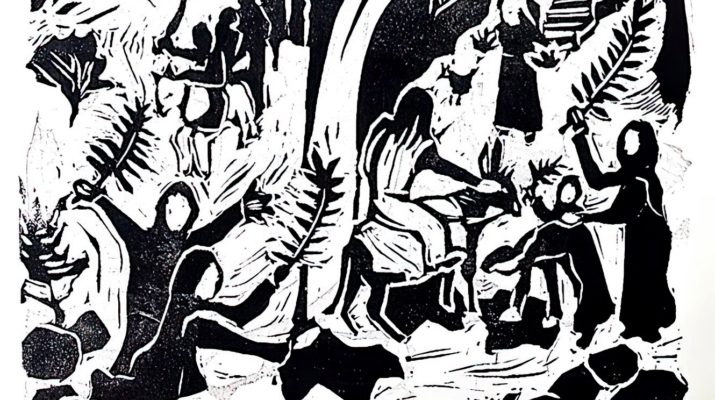Luke 19:28-40
Palm Sunday C20
28 After he had said this, he went onA ahead, going upB to Jerusalem.C
A “went on” = poreuomai. From poros (ford, passageway). This is to go, travel, journey, or die. It refers to transporting things from one place to another and focuses on the personal significance of the destination.
B “going up” = anabaino. From ana (up, back, among, again, anew) + the same as basis (step, hence foot; a pace); {from baino (to walk, to go)}. This is to come up in a literal or figurative sense – ascent, rise, climb, enter.
C “Jerusalem” = Hierosoluma. From Hebrew yerushalaim (probably foundation of peace); {from yarah (to throw, shoot, be stunned; to flow as water so figuratively to instruct or teach) + shalam (to make amends, to be complete or sound)}. This is Jerusalem, dwelling of peace.
29 WhenD he had come nearE BethphageF and Bethany,G
D {untranslated} = ginomai. This is to come into being, to happen, become, be born. It can be to emerge from one state or condition to another or is coming into being with the sense of movement or growth.
E “come near” = eggizo. From eggus (nearby or near in time). This is extremely close by – approaching, at hand, immediately imminent.
F “Bethphage” = Bethphage. 3x in NT– all in Jesus’s Palm Sunday entry into Jerusalem. From Aramaic beth phagy (Bethphage, house of unripe figs). This is Bethphage, house of unripe or early figs.
G “Bethany” = Bethania. Related to “Bethphage” in v29. 12x in NT. From Aramaic beth anya (house of affliction, misery, wretchedness). This is Bethany.
at the place calledH the MountI of Olives,J
H “called” = kaleo. Related to keleuo (to command, order, direct); from kelomai (to urge on). This is to call by name, invite, to name, bid, summon, call aloud.
I “Mount” = oros. Perhaps from oro (to rise); perhaps akin to airo (raise, take up, lift, remove). This is mountain or hill.
J “Olives” = elaia. 15x in NT. This is olive or olive tree. Sometimes, it refers to the chosen people.
he sentK twoL of the disciples,M
K “sent” = apostello. From apo (from, away from) + stello (to send, set, arrange, prepare, gather up); {probably from histemi (to make to stand, stand, place, set up, establish, appoint, stand firm, be steadfast)}. This is to send forth, send away, dismiss, send as a messenger. It implies one that is sent for a particular mission or purpose rather than a quick errand. This is where “apostle” comes from.
L “two” = duo. This is two or both.
M “disciples” = mathetes. From matheteuo (to make a disciple of); from manthano (to learn key facts, gain knowledge from experience; generally implies reflection as part of the learning process); from math– (thinking things through). This is a disciple, learner, or student. It is where we get “mathematics” from.
30 saying,N “GoO into the villageP ahead of you,
N “saying” = lego. This is to speak, say, name, call, command. It is generally to convey verbally.
O “go” = hupago. From hupo (by, under, under the authority of) + ago (lead, bring, guide, spend, drive, carry). This is to lead under so to depart, go away, or die. It is to lead away under the command of someone else, being given a mission or objective to carry out.
P “village” = kome. This is a village as contrasted with a city that has a wall.
and as you enterQ it you will findR tiedS there
Q “enter” = eisporeuomai. Related to “went on” in v28. 18x in NT. From eis (to, into, for, among) + poreuomai (see note A above). 18x in NT. This is to enter or journey in in a literal or figurative sense.
R “find” = heurisko. This is to find, learn, or obtain. It is to discover something, which generally implies a period of searching for it. This is to find in a literal or figurative sense. This is where the word “heuristic” comes from.
S “tied” = deo. To tie, bind, compel, put in chains. This is to bind in a literal or figurative sense. Can also mean declaring something unlawful.
a coltT that has never been ridden.U UntieV it and bringW it here.
T “colt” = polos. 12x in NT– all in Jesus’s Palm Sunday entry into Jerusalem. This is foal, colt, or young donkey.
U “never been ridden” = epi + hos + oudeis + popote + anthropos + kathizo. Literally, “upon which no person as yet sat.” Anthropos is probably from aner (man, male, husband) + ops (eye, face); {from optanomai (to appear, be seen); perhaps from horao (become, seem, appear)}. This is human, humankind. Used for all genders. Kathizo is from kathezomai (to sit down, be seated); {from kata (down, against, according to, among) + hezomai (to sit); {from aphedron (a seat, a base)}}. This is to sit, set, appoint, stay, rest.
V “untie” = luo. This is to loose, release, or untie. Figuratively, it can mean to break, destroy, or annul. This is releasing what had been withheld.
W “bring” = ago. Related to “go” in v30. See note O above.
31 If anyone asksX you, ‘Why are you untying it?’ just sayY this, ‘The LordZ needsAA it.’”
32 So those who were sent departedBB and found it as he had told them. 33 As they were untying the colt, its ownersCC asked them, “Why are you untying the colt?”
X “asks” = erotao. From eromai (to ask) OR from ereo (to say, tell, call, speak of). This is asking a question or making an earnest request. It is used between someone with whom the asker is close in some sense. So, they anticipate special consideration for their request.
Y “say” = ereo. Related to “asks” in v31. See note X above.
Z “Lord” = kurios. From kuros (authority, supremacy). This is a respectful address meaning master or sir. It refers to one who has control or power greater than one’s own. So, it was also applied to God and Jesus as Master or Lord.
AA “needs” = chreia + echo. Literally, “has need.” Chreia is from chraomai (to use, make use of, give what is needed, act in a specific way, request); related to chre (what is proper, fitting, or necessary). This is the is task, business, or affair. It can also be need, want, or destitution. Echo is to have, hold, possess.
BB “departed” = aperchomai. From apo (from, away from) + erchomai (to come or go). This is to depart, follow, or go off in a literal or figurative sense.
CC “owners” = kurios. Same as “Lord” in v31. See note Z above.
34 They said, “The Lord needs it.” 35 Then they brought it to Jesus;DD and after throwingEE their cloaksFF on the colt, they set Jesus onGG it.
DD “Jesus” = Iesous. From Hebrew Yehoshua (Joshua, the Lord is salvation); {from YHVH (proper name of the God of Israel; the self-existent and eternal one); {from havah (to become) or from hayah (to come to pass, become, be)} + yasha (to deliver, defend, help, preserve, rescue; properly, to be open, wide or free, which implies being safe. So, in a causative sense, this is to free someone)}. This is Jesus or Joshua in Greek – the Lord saves or the Lord is salvation.
EE “throwing” = epiripto. 2x in NT. From epi (on, upon, among, what is fitting) + rhipto (to cast, toss fling, or disperse; a quick toss in contrast to another word ballo, intentional hurling, and teino (stretching outward)); {perhaps related to rhapizo (to hit with a rod or to slap); from a derivation of rhabdos (staff, rod, cudgel; a staff that denotes power, royalty, or authority); from rhepo (to let fall, to rap)}. This is to throw or cast in a literal or figurative sense (like casting you anxiety on God).
FF “cloaks” = himation. From heima (garment) OR from ennumi (to put on). This is the outer garment, cloak, robe, or mantle. It is worn loosely over a tunic.
GG “set…on” = epibibazo. Related to “going up” in v28. 3x in NT– including the Good Samaritan putting the wounded man on his own animal. From epibaino (to board, a horse or vessel, step on, arrive, go abroad); {from epi (on, upon, against, what is fitting) + baino (see note B above)}. This is to place on.
36 As he rode along,HH people kept spreadingII their cloaks on the road.JJ
HH “rode along” = poreuomai. Same as “went on” in v28. See note A above.
II “spreading” = hupostronnuo. 1x in NT. From hupo (by, under, about, under someone’s authority) + stronnuo (to spread, make a bed). This is to spread under like a carpet.
JJ “road” = hodos. This is way, road, path, or journey. It can imply progress along a route.
37 As he was now approachingKK the path downLL from the Mount of Olives, the wholeMM multitudeNN of the disciples
KK “approaching” = eggizo. Same as “come near” in v29. See note E above.
LL “path down” = katabasis. Related to “going up” in v28 & “set…on” in v35. 1x in NT. From katabaino (to come down whether from the sky to the ground or from higher ground to lower, literal or figurative); {from kata (down, against, throughout, among) + baino (see note B above)}. This is a descent or path down.
MM “whole” = hapas. From hama (at once, together with) + pas (all, every, every kind of) OR from a (with) + pas (see above). This is all; every part working together as a unit.
NN “multitude” = plethos. From pletho (to fill, accomplish, supply; to fill to maximum capacity). This is fullness, multitude, great number.
beganOO to praisePP GodQQ joyfullyRR
OO “began” = archomai. From archo (to rule, begin, have first rank or have political power). This is to begin or rule.
PP “praise” = aineo. 8x in NT. From ainos (praise, saying, story, proverb). This is to praise.
QQ “God” = Theos. From Proto-Indo-European origins, meaning do, put, place. This is God or a god in general.
RR “joyfully” = chairo. From char– (to extend favor, lean towards, be inclined to be favorable towards). This is to rejoice, be glad or cheerful; a greeting. This is the root verb that the Greek word for “grace” comes from (charis).
with a loudSS voiceTT for allUU the deeds of powerVV that they had seen,WW
SS “loud” = megas. This is big in a literal or figurative sense – great, large, exceeding, abundant, high, mighty, perfect, strong, etc.
TT “voice” = phone. Probably from phemi (to declare, say, use contrasts in speaking to shed light on one point of view); {from phao (to shine) or phaino (to bring light, cause to appear, shine, become visible or clear). This is a voice, sound, tone or noise. It can also be a language or dialect.
UU “all” = pas. Same as “whole” in v37. See note MM above.
VV “deeds of power” = dunamis. From dunamai (to be able, have power or ability). This is might, strength, physical power, efficacy, energy, and miraculous power. It is force literally or figuratively – the power of a miracle or the miracle itself.
WW “seen” = horao. Related to {untranslated} in v30. See note U above.
38 saying,
“Blessed isXX the kingYY
who comesZZ in the nameAAA of the Lord!
XX “blessed is” = eulogeo. Related to “saying” in v30. From eu (good, well, well done, rightly) + logos (word, statement, speech, analogy; a word that carries an idea or expresses a thought, a saying; a person with a message or reasoning laid out in words; by implication, a topic, line of reasoning, or a motive; can be used for a divine utterance or as Word – Christ); {from lego (see note N above)}. Properly, this is speaking well of – speaking so that the other is benefited. It can mean praise, bless, thank, or call for a blessing. This is where “eulogy” comes from.
YY “king” = basileus. Related to “going up” in v28 & “set…on” in v35 & “path down” in v37. Probably from basis (see note B above). This is king, emperor, or sovereign.
ZZ “comes” = erchomai. Related to “departed” in v32. See note BB above.
AAA “name” = onoma. May be from ginosko (know, recognize, learn from firsthand experience). This is a name, authority, cause, character, fame, reputation. The name was thought to include something of the essence of the person so it was not thought to be separate from the person.
PeaceBBB in heaven,CCC
and gloryDDD in the highestEEE heaven!”
BBB “peace” = eirene. Perhaps from eiro (to join, tie together to form a whole). This is one, peace, quietness, rest, peace of mind, harmony. Peace was a common farewell among Jews (i.e. shalom) and this well-wishing included a blessing of health and wholeness for the individual. This word also indicates wholeness and well-being – when everything that is essential is joined together properly. This is peace literally or figuratively. By implication, it is prosperity (but not in the sense of excessive wealth. Prosperity would have meant having enough from day to day.)
CCC “heaven” = ouranos. Related to “Mount” in v29. May be related to oros (see note I above) with the notion of height. This is the air, the sky, the atmosphere, and heaven. It is the sky that is visible and the spiritual heaven where God dwells. Heaven implies happiness, power, and eternity.
DDD “glory” = doxa. From dokeo (to have an opinion, seem, appear, suppose; a personal judgment; to think); from dokos (opinion). This is literally something that evokes a good opinion – something that connects to our understanding of intrinsic worth. The ultimate expression of this is, of course, God and God’s manifestation. So, this is opinion, honor, and dignity, but also praise, glory, renown, and worship.
EEE “highest” = hupistos. 13x in NT. From hupsos (height, high position, heaven, dignity, eminence; elevation, altitude; to be exalted); from hupsi (on high, aloft); from huper (over, above, beyond) This is highest, heights, heaven. It can also refer to God as Most High or the Supreme One.
39 Some of the PhariseesFFF in the crowdGGG said to him, “Teacher,HHH order your disciples to stop.”III
FFF “Pharisees” = Pharisaios. From Aramaic peras (to divide, separate) and from Hebrew parash (to make distinct, separate, scatter). This is a Pharisee, a member of a Jewish sect active in the 1st century. Their name meant separate in the sense of wanting to live a life separated from sin. Whereas the Sadducees were part of the priestly line and inherited their religious position and responsibilities, Pharisees were regular people who studied the scriptures and offered guidance to regular folk. Sadducees were often wealthier and willing to sacrifice their identity to rub elbows with Roman society. Pharisees were often more concerned with what it meant to follow God without compromising what made them different as followers of God. Sadducees primarily believed in that which was written down (the first five books of the Bible) and Pharisees believed in the Bible and the traditions of the elders. Pharisees had a very wide range of interpretations and diversity of opinion. Their standard mode of religious engagement was lively debate with one another. To argue religion with another teacher was to recognize that they had something of value to offer.
GGG “crowd” = ochlos. Related to “needs” in v31. Perhaps from echo (see note AA above). This is a crowd, the common people, a rabble. Figuratively, it can refer to a riot.
HHH “Teacher” = didaskalos. From didasko (to teach, direct, instruct, or impart knowledge; in the New Testament, almost always used for teaching scripture); from dao (to learn). This is teacher or master.
III “order…to stop” = epitimao. From epi (on, upon, against, what is fitting) + timao (properly, this is setting a value or price on something, to estimate. Figuratively, it speaks to what level of honor we afford someone or something depending on our personal feeling toward it. By implication, this can mean to revere or honor); {from time (worth or perceived value; literally, price, but figuratively, the honor or value one sees in someone or something; can be esteem or dignity; can also mean precious or valuables); from tino (to pay, be punished, pay a penalty or fine because of a crime); from tio (to pay respect, value)}. This is to render what is due – to assign the value that is appropriate for the situation. So, it could mean to honor or to warn, to rebuke or to charge. Generally, it is a warning meant to guide someone away from doing something wrong or taking the wrong path. It can imply to forbid.
40 He answered, “I tell you, if these were silent,JJJ the stonesKKK would shout out.”LLL
JJJ “were silent” = siopao. 10x in NT. From siope (silence or muteness). This is to be silent whether by choice or not. Figuratively, this is being calm as water, keeping one’s peace.
KKK “stones” = lithos. This is stone in a literal or figurative sense.
LLL “shout out” = krazo. This is to cry out, scream, shriek. It is onomatopoeia for the sound of a raven’s call. Figuratively, this means crying out urgently without intelligible words to express something that is deeply felt.
Image credit: “Palm Sunday: Even the Stones” by Cara B. Hochhalter, 2019.




